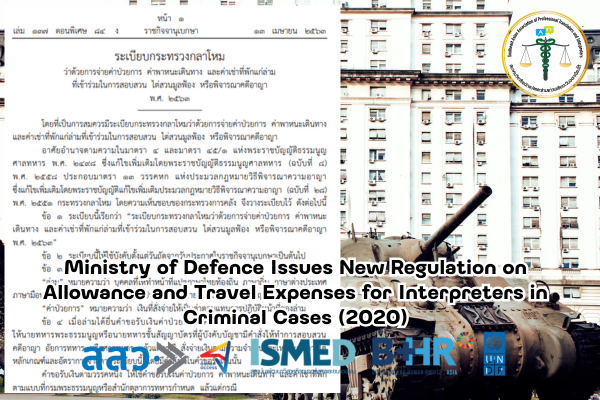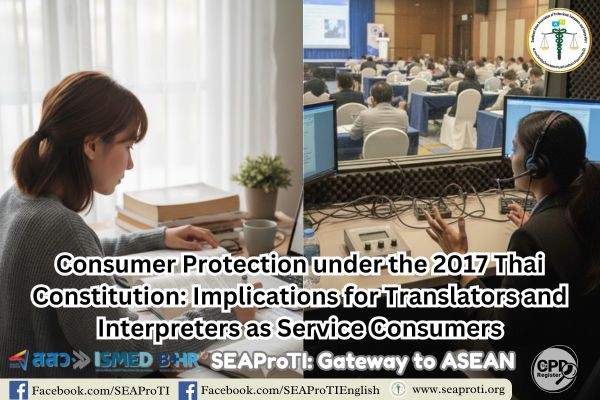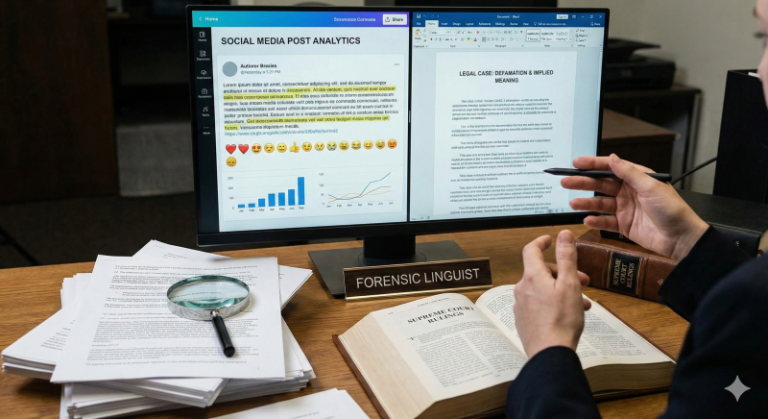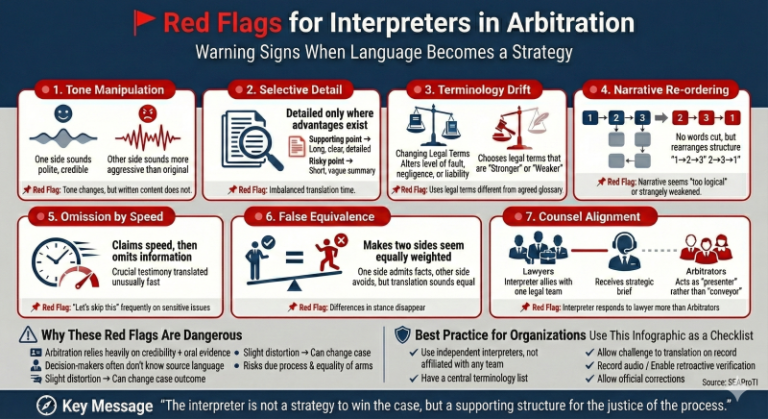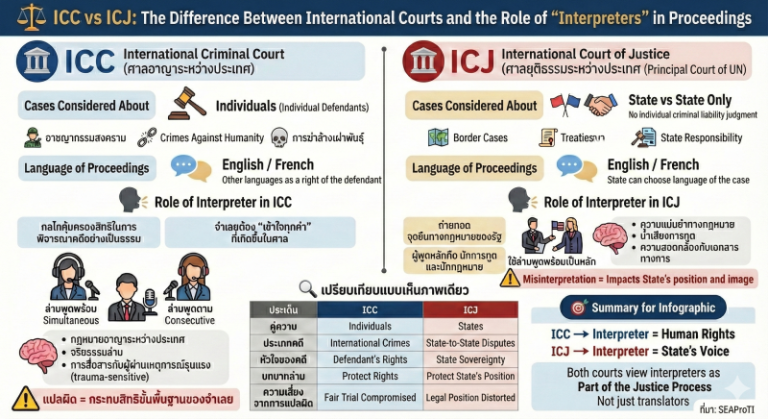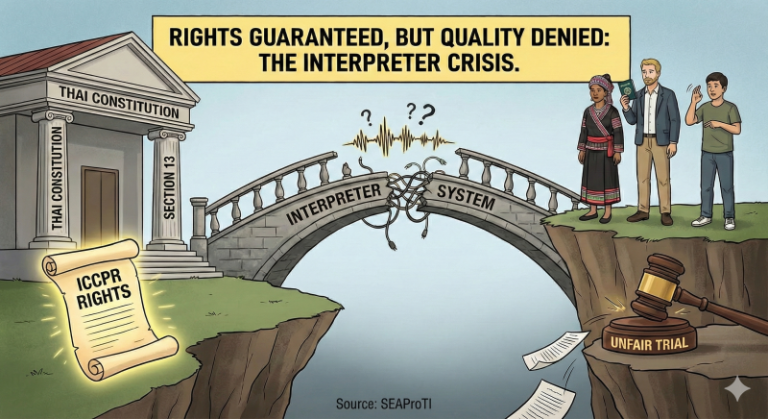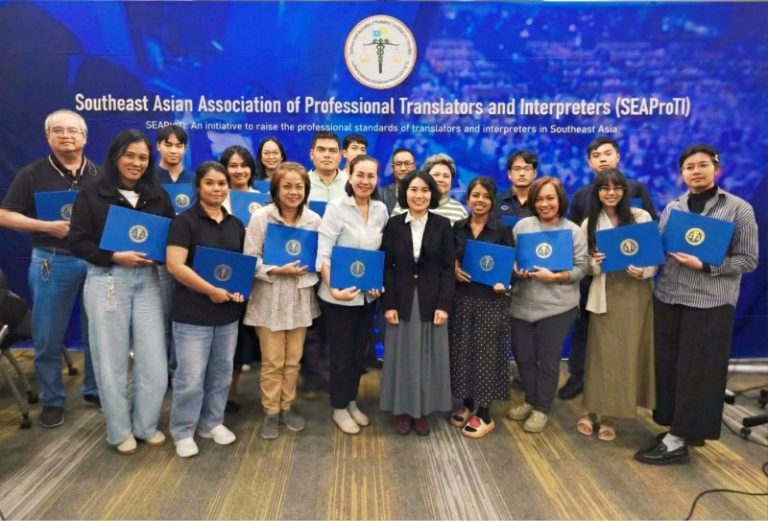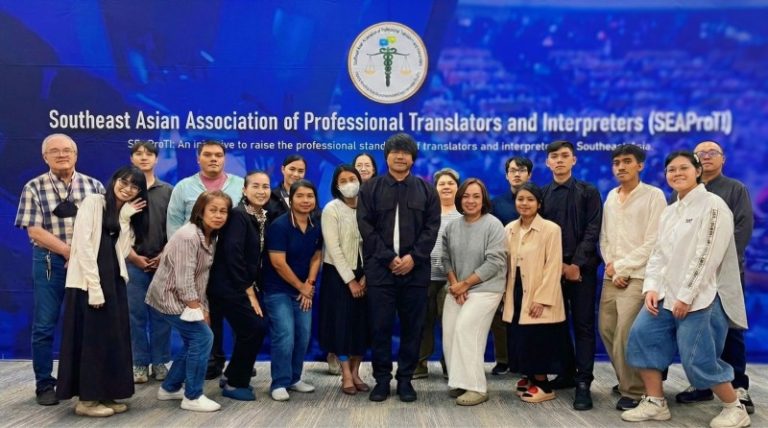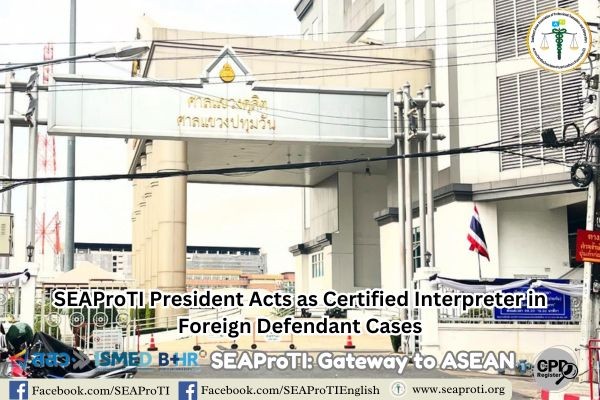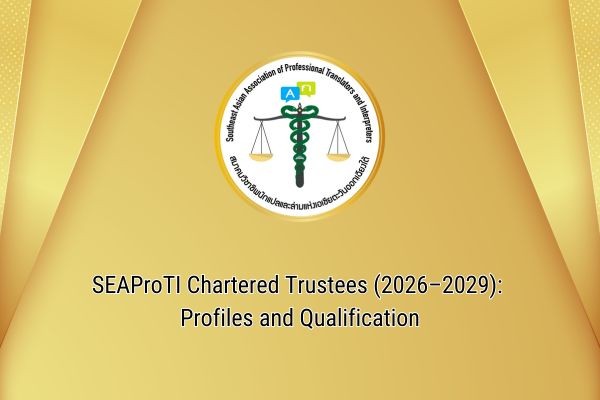Ministry of Defence Issues New Regulation on Allowance
and Travel Expenses for Interpreters in Criminal Cases (2020)
Bangkok, 3 April 2020 – The Ministry of Defence has announced the enforcement of the Regulation on the Allowance, Travel Expenses, and Accommodation for Interpreters Participating in Criminal Investigations, Preliminary Hearings, or Trials in Military Courts B.E. 2563 (2020). The regulation took effect the day after its publication in the Royal Gazette.
Key Provisions:
Definition of Interpreter:
The regulation defines “interpreter” as any person interpreting local Thai dialects, foreign languages, sign language, or other forms of communication used in criminal proceedings.
Interpreter Allowance Rates:
- Paid on an hourly basis, ranging from THB 500 to THB 800 per hour.
- Minimum THB 500, maximum not exceeding THB 2,400 per day.
Payment considerations include the complexity of the interpretation, qualifications, and expertise of the interpreter.
Travel and Accommodation Expenses:
- For government officials or state employees, reimbursement follows existing official regulations.
- For external interpreters, payments are equivalent to those of a military officer holding the rank of Colonel, Navy Captain, or Group Captain.
Disbursement Requirements:
- Written authorization and proof of service are required.
- Payments are made from the government budget.
Special Provisions:
If an interpreter appears at court as summoned but does not perform duties through no fault of their own, they are still entitled to receive the allowance, travel, and accommodation expenses.
Responsible Authority:
The Permanent Secretary of the Ministry of Defence is designated to enforce the regulation.
Signatory:
General Prayut Chan-o-cha, Minister of Defence at the time.
Circumstances Requiring Interpreters in Thai Military Courts
According to Section 13 of the Criminal Procedure Code (applicable to military courts), an interpreter must be provided when a party or witness cannot understand or speak Thai or is otherwise unable to communicate.
1. Foreign Defendants or Suspects
Example: Foreign military personnel, technicians, or civilians violating military laws or trespassing in restricted military zones.
Case Example: Mr. John Doe (American citizen) illegally entered a restricted Royal Thai Navy area without permission.
2. Non-Thai Speaking Witnesses
Example: Foreign witnesses in military-related cases, such as crew members from foreign merchant vessels intercepted in Thai waters.
3. Hearing or Speech-Impaired Defendants or Witnesses
Example: Thai military personnel with hearing disabilities requiring sign language interpretation in court.
Case Example: Private A, a hearing-impaired soldier, is facing disciplinary charges under military law.
4. Ethnic Minority Defendants Speaking Local Dialects
Example: Military conscripts from minority groups (e.g., Karen, Hmong) who speak regional languages and have limited understanding of central Thai.
5. Special Circumstances at the Discretion of the Court or Military Prosecutor
Interpreters may be appointed when language barriers could affect the defendant’s right to a fair trial or impede judicial fairness, even if the individual has a partial understanding of Thai.
Conclusion
This regulation strengthens the legal rights and protections of interpreters participating in criminal proceedings in military courts. It provides clarity and consistency in the compensation process and helps prevent disputes over entitlements.
The use of interpreters in Thai military courts ensures the protection of defendants’ and witnesses’ rights, upholding principles of fairness and human rights. Interpreters must be officially appointed by the military court or military prosecutor to participate in proceedings.
SEAProTI’s certified translators, translation certification providers, and certified interpreters:
The Southeast Asian Association of Professional Translators and Interpreters (SEAProTI) has officially announced the criteria and qualifications for individuals to register as “Certified Translators,” “Translation Certification Providers,” and “Certified Interpreters” under the association’s regulations. These guidelines are detailed in Sections 9 and 10 of the Royal Thai Government Gazette, issued by the Secretariat of the Cabinet under the Office of the Prime Minister of the Kingdom of Thailand, dated July 25, 2024, Volume 141, Part 66 Ng, Page 100.
To read the full publication, visit: the Royal Thai Government Gazette
กระทรวงกลาโหมออกระเบียบใหม่ จ่ายค่าป่วยการและค่าเดินทางแก่ล่ามในคดีอาญา พ.ศ. 2563
กรุงเทพฯ, 3 เมษายน 2563 – กระทรวงกลาโหม ประกาศใช้ ระเบียบกระทรวงกลาโหมว่าด้วยการจ่ายค่าป่วยการ ค่าพาหนะเดินทาง และค่าเช่าที่พักแก่ล่ามที่เข้าร่วมในการสอบสวน ไต่สวนมูลฟ้อง หรือพิจารณาคดีอาญา พ.ศ. 2563 โดยมีผลบังคับใช้ตั้งแต่วันถัดจากวันประกาศในราชกิจจานุเบกษา
สาระสำคัญของระเบียบใหม่ ได้แก่:
กำหนดนิยาม “ล่าม” ให้ครอบคลุมผู้แปลภาษาไทยท้องถิ่น ภาษาต่างประเทศ ภาษามือ หรือสื่อความหมายอื่นในการพิจารณาคดีอาญา
อัตราค่าป่วยการล่าม:
- คิดเป็นรายชั่วโมง ระหว่าง 500–800 บาทต่อชั่วโมง
- ขั้นต่ำ 500 บาท สูงสุดไม่เกิน 2,400 บาทต่อวัน
การพิจารณาจ่ายขึ้นอยู่กับความยากง่าย คุณวุฒิ และความเชี่ยวชาญของล่าม
ค่าพาหนะและค่าเช่าที่พัก:
- หากเป็นข้าราชการหรือเจ้าหน้าที่รัฐ ให้จ่ายตามระเบียบราชการ
- หากเป็นล่ามภายนอก ให้จ่ายเทียบเท่าข้าราชการทหารยศพันเอก นาวาเอก หรือ นาวาอากาศเอก
ข้อกำหนดการเบิกจ่าย:
- ต้องมีคำสั่งรับรองและหลักฐานการปฏิบัติหน้าที่
- การเบิกจ่ายทำจากงบประมาณทางราชการ
สิทธิของล่ามกรณีพิเศษ: หากล่ามมาตามนัดศาลทหารแต่ไม่ได้ปฏิบัติหน้าที่ โดยไม่ใช่ความผิดของล่ามเอง มีสิทธิได้รับค่าป่วยการ ค่าพาหนะ และค่าเช่าที่พักตามระเบียบนี้เช่นกัน
ผู้รับผิดชอบ: ปลัดกระทรวงกลาโหมเป็นผู้รักษาการตามระเบียบนี้
ผู้ลงนาม: พลเอก ประยุทธ์ จันทร์โอชา รัฐมนตรีว่าการกระทรวงกลาโหม (ขณะนั้น)
กรณีที่ต้องใช้ล่ามในศาลทหารไทย
ตามมาตรา 13 ประมวลกฎหมายวิธีพิจารณาความอาญา (ซึ่งใช้ร่วมกับศาลทหาร) กำหนดให้ต้องมีล่ามในกรณีที่คู่ความหรือพยานไม่สามารถเข้าใจหรือพูดภาษาไทยได้ หรือสื่อสารไม่ได้ด้วยตนเอง เช่น เป็นคนต่างชาติ หรือมีความบกพร่องทางการได้ยินหรือการพูด
1. จำเลยหรือผู้ต้องหาที่เป็นชาวต่างชาติ
ตัวอย่าง: ทหารต่างชาติ, ช่างเทคนิค หรือพลเรือนต่างชาติที่กระทำผิดในพื้นที่ที่อยู่ในอำนาจศาลทหาร เช่น บุกรุกพื้นที่ทหาร, กระทำความผิดเกี่ยวกับความมั่นคง
เช่น: นาย John Doe (สัญชาติอเมริกัน) บุกรุกเข้าเขตหวงห้ามของกองทัพเรือไทยโดยไม่ได้รับอนุญาต
2. พยานที่ไม่สามารถพูดหรือเข้าใจภาษาไทย
ตัวอย่าง: พยานต่างชาติที่เข้ามาให้การเกี่ยวกับคดีความผิดในเขตทหาร เช่น พนักงานเรือสินค้าต่างชาติที่ถูกตรวจพบการกระทำผิดในน่านน้ำไทย
3. ผู้ต้องหาหรือพยานที่มีความบกพร่องทางการได้ยินหรือการพูด
ตัวอย่าง: พลทหารไทยที่พิการทางการได้ยิน ต้องใช้ล่ามภาษามือเพื่อสื่อสารระหว่างกระบวนการพิจารณาคดี
เช่น: พลทหาร A ผู้พิการทางการได้ยิน ถูกกล่าวหาว่าทำผิดวินัยทหาร
4. ผู้ต้องหาที่พูดภาษาถิ่นหรือภาษาชนเผ่า
ตัวอย่าง: ทหารกองประจำการจากชนกลุ่มน้อย เช่น กะเหรี่ยง ม้ง ที่พูดภาษาถิ่นและไม่สามารถเข้าใจภาษาไทยกลางได้ดี
5. กรณีพิเศษตามดุลยพินิจของศาลหรืออัยการทหาร
หากศาลเห็นว่าความเข้าใจภาษาอาจกระทบต่อสิทธิในการต่อสู้คดีของจำเลย หรือความเป็นธรรมในการพิจารณาคดี ศาลสามารถแต่งตั้งล่ามได้แม้ผู้กล่าวหาเข้าใจภาษาไทยเพียงบางส่วน
สรุป:
การออกระเบียบฉบับนี้ถือเป็นการเพิ่มหลักประกันสิทธิประโยชน์ให้กับล่ามที่เข้าร่วมในกระบวนการยุติธรรม โดยเฉพาะในศาลทหาร ช่วยสร้างความชัดเจนและมาตรฐานในการจ่ายค่าตอบแทน รวมถึงลดปัญหาข้อพิพาทหรือความไม่ชัดเจนในการเบิกจ่าย
การใช้ล่ามในศาลทหารไทยเป็นมาตรการเพื่อ คุ้มครองสิทธิของผู้ต้องหาและพยาน ตามหลักความเป็นธรรมและสิทธิมนุษยชน โดยล่ามต้องได้รับการแต่งตั้งตามขั้นตอนของศาลทหารหรืออัยการทหาร
เกี่ยวกับนักแปลรับรอง ผู้รับรองการแปล และล่ามรับรองของสมาคมวิชาชีพนักแปลและล่ามแห่งเอเชียตะวันออกเฉียงใต้
สมาคมวิชาชีพนักแปลและล่ามแห่งเอเชียตะวันออกเฉียงใต้ (SEAProTI) ได้ประกาศหลักเกณฑ์และคุณสมบัติผู้ที่ขึ้นทะเบียนเป็น “นักแปลรับรอง (Certified Translators) และผู้รับรองการแปล (Translation Certification Providers) และล่ามรับรอง (Certified Interpreters)” ของสมาคม หมวดที่ 9 และหมวดที่ 10 ในราชกิจจานุเบกษา ของสำนักเลขาธิการคณะรัฐมนตรี ในสำนักนายกรัฐมนตรี แห่งราชอาณาจักรไทย ลงวันที่ 25 ก.ค. 2567 เล่มที่ 141 ตอนที่ 66 ง หน้า 100 อ่านฉบับเต็มได้ที่: นักแปลรับรอง ผู้รับรองการแปล และล่ามรับรอง


